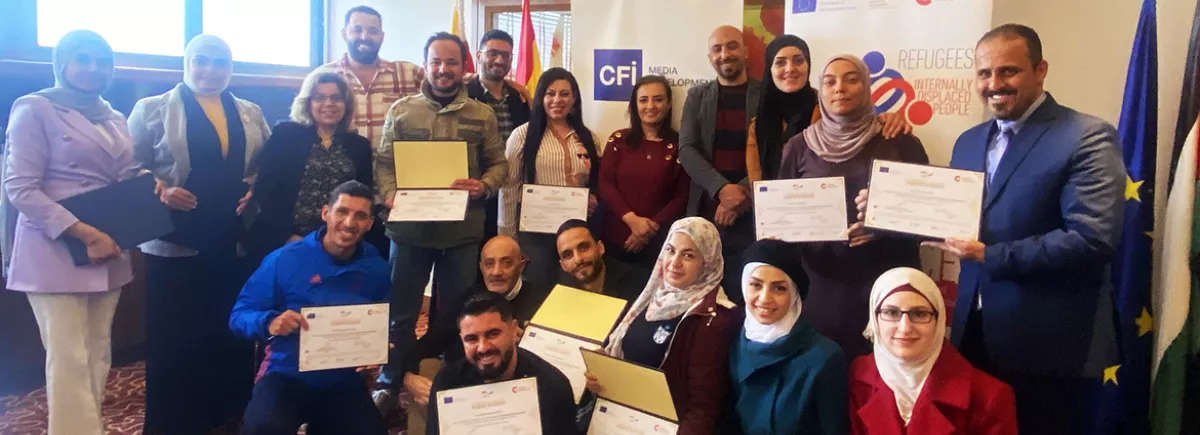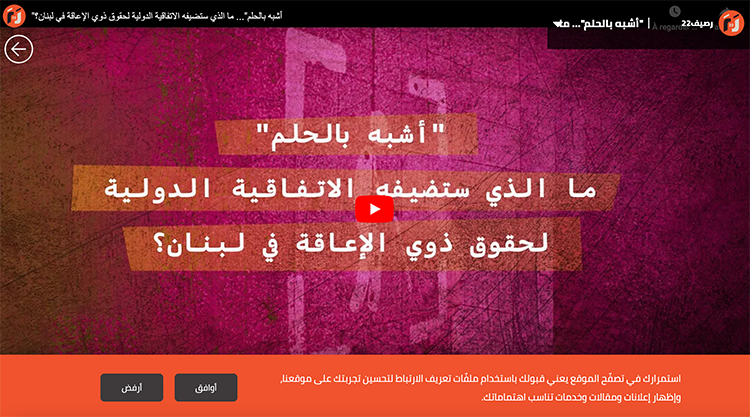
More inclusive journalism: Qudra 2's impact on media representation of Syrian refugees in Jordan
Related project
Qudra 2Journalists underwent trainings to improve news sharing and refugee success stories in Jordan as part of the Qudra 2 project, which aims to build resilience among Syrian refugees in Jordan and foster social cohesion. Following the training sessions, the journalists discussed topics that could transform the way this category of people is represented in the Jordan media.
Ghadeer Al-Saadi puts the spotlight on the story of Um Maarout, a Syrian woman who had to flee the war in Syria in 2013 to seek refuge in Jordan, leaving her entire family behind. In the columns of Al-rai newspaper, Ghadeer traces Maarout's journey.
Before reaching Jordan, this Syrian woman stayed in a transit camp, like many Syrians who flee their country because of the war. After a year, she arrived in Jordan. With no help from international organizations, Maarout was able to survive thanks to the generosity of neighbors who reached out to her.
While her story is marked by dark episodes, Maarout now says she is happy thanks to a business activity she started in 2018 that allows her to help her family in Syria. In addition, she now fights for the respect of human rights and has set up a human rights foundation in Jordan.
Agyad Abu Zaid and Ola Keresley, two Syrian journalists, described the life of Umm Ahmed on the Ammanet website. The 70-year-old Syrian refugee lost track of her husband, son and daughter-in-law. Left alone with three small children, Umm Ahmed works on farms and looks after livestock to support them.
Every day, Oum has to prepare her three grandchildren for school before going to work on the farms. This grandmother's fondest dream is to see her grandchildren complete their education so that they can take over when the time comes.
In addition to news articles, journalists who benefited from the training workshops produced videos to highlight the lives of refugees who are often invisible in host countries.
Mahmoud-highlighting Child protection
{"preview_thumbnail":"/sites/default/files/styles/video_embed_wysiwyg_preview/public/video_thumbnails/-j9S_yzk4nM.jpg.webp?itok=aoGrUWk2","video_url":"https://youtu.be/-j9S_yzk4nM","settings":{"responsive":1,"width":"854","height":"480","autoplay":1,"title_format":"@provider | @title","title_fallback":true},"settings_summary":["Embedded Video (Responsive, autoplaying)."]}
The purpose of the video is to encourage parents and guardians to take their children to the nearby Social Development Centers to participate in Psychosocial Support programs. The video features the inspiring story of Mahmoud, an 11-year-old boy who greatly benefited from the psychosocial support activities he attended at the Social Development Centers. His experience helped him develop in many ways, and the video aims to motivate other children and their caregivers to take advantage of these valuable resources.
Sara-highlighting women protection
{"preview_thumbnail":"/sites/default/files/styles/video_embed_wysiwyg_preview/public/video_thumbnails/xGjw5eKRWSM.jpg.webp?itok=jxqZ3b_Q","video_url":"https://youtu.be/xGjw5eKRWSM","settings":{"responsive":1,"width":"854","height":"480","autoplay":1,"title_format":"@provider | @title","title_fallback":true},"settings_summary":["Embedded Video (Responsive, autoplaying)."]}
The objective of the video is to encourage women to seek counselling support or enroll in psychosocial support activities at their nearest Social Development Centers. The video showcases the success story of Sara, who was a victim of abuse and mistreatment but found empowerment and support through the psychological services and case management provided by the Centers.
These videos offer a more nuanced and human perspective on the reality of Syrian refugees in Jordan and the situation of the Lebanese. This move towards more inclusive and representative journalism paves the way for better mutual understanding between communities, strengthens social cohesion, and contributes to a more just and equitable society.



